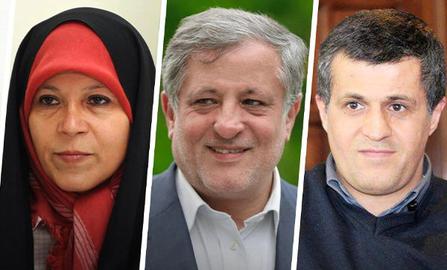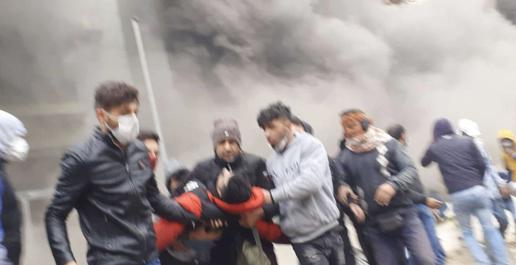Faezeh Hashemi is one of the Iranian elite’s most vociferous and influential critics inside the country. It may have only become big news over the last few years, but this friction has a long history. Recently she spoke out on the Clubhouse app about events going back in 2013, and specifically, the presidential election of that year.
In 2013 Faezeh Hashemi’s father, Akbar Hashemi Rafsanjani — a core architect of the Islamic Republic and president from 1989 to 1997 — was disqualified from running for president again. The move shocked the nation, especially given that Rafsanjani had always been a close ally of Ayatollah Khomeini, the founder of the Islamic Revolution and the republic that resulted from it. It signified a profound shift in Iranian politics and the way its specific Islamic ideology plays out in public life.
Rafsanjani’s family and supporters were outspoken against the decision at the time. Mohsen Hashemi, Rafsanjani’s son, even wrote to the Supreme Leader, though Faezeh Hashemi was adamant that her father’s disqualification had the approval of Ayatollah Ali Khamenei.
Recent remarks by Heydar Moslehi, the Minister of Intelligence in the Mahmoud Ahmadinejad administration, have sparked fresh controversy around the incident. Moslehi has said he played a key role in barring Rafsanjani from running, offering the Guardian Council — the body that officially approves candidates — his assessment of the political outcome of letting Rafsanjani run versus barring him.
At the time, Moslehi said, there was solid information to suggest that if allowed to run, Rafsanjani would win the election. The statements emerged as Moslehi prepared to put himself forward for the powerful body the Assembly of Experts.
An article in Kayhan newspaper appeared to lament Moslehi’s statements because of how they could be used by perceived enemies: "Moslehi's remarks were met with a negative reaction from many members of parliament, political figures and social media users, and of course, as usual, the reformist and counter-revolutionary media have published them with enthusiasm, citing them as proof of their claim of electoral engineering by the Guardian Council."
In the recent Clubhouse event, which saw Faezeh Hashemi appear alongside her brother Yasser Hashemi and Sadegh Zibakalam, a professor of political science at the University of Tehran, the former repeated her previous assertions, saying father’s disqualification could not have taken place without coordination with the Leader.
She reiterated that ahead of the 2021 election, which will take place on Friday, June 18, the Guardian Council also sent the list of approved candidates to the Supreme Leader. That final list was only published after the Leader had confirmed and approved it.
All of this is consistent with what appears on the office of Ayatollah Khamenei’s website, which reports that the Guardian Council had asked the leadership to approve candidates. But there’s a key diffeerence: Khamenei's website claims the Leader clearly stated that he had no intention of interfering in the election. And that is not what Faezeh Hashemi believes is true now, or was in 2013.
Faezeh Hashemi insisted that Moslehi was talking “rubbish”. Yasser Hashemi, another of Rafsanjani’s sons, also commented on Moslehi's candidacy for the Assembly of Experts, suggesting that Moslehi was doing it for his own political gain and was not concerned with Iran’s governance or the Iranian public in general.
A Shock to the Nation
Both Faezeh and Yasser Hashemi spoke again of their surprise at their father’s disqualification back in 2013. Yasser Hashemi recalled his father’s own shock: "Does Jannati dare to disqualify me?” he reportedly asked – referring to Ahmad Jannati, the Secretary of the Guardian Council then and now, who is now also Chairman of the Assembly of Experts.
Sadegh Zibakalam said during the Chatroom event that Rafsanjani "had never even dreamed of being disqualified.”
But not everybody was as surprised as he in 2013. Ayatollah Khomeini’s son Hassan Khomeini had forewarned Rafsanjani he would be blacklisted: “The social wave is so strong they cannot tolerate it,” he apparently said, hinting at how volatile the political climate was becoming at the time, and at the widening gap between the public will and that of the politicians.
Yasser Hashemi also said that his father had told the Supreme Leader some time before the election that he would not be running, but the political atmosphere at the time then changed his mind. This again suggests a rift between the electorate and the leaders of the Islamic Republic.
According to Yasser Hashemi, those who engineered the election at the time also based their plans on Rafsanjani not being a contender. Yasser Hashemi said that Mahmoud Ahmadinejad and Esfandiar Rahim Mashaei, a close ally of the outgoing president, had been stationed at the Ministry of the Interior and were preparing for Mashaei to register if Hashemi Rafsanjani did, under the assumption that the Guardian Council would not reject Hashemi Rafsanjani and therefore would not disqualify Mashaei either.
Faezeh Hashemi has long been explicit and outspoken in blaming Khamenei and his role in ousting her father. But other Hashemi relatives took the view that Moslehi played the biggest role. They did not go as far as Rafsanjani’s daughter did in singling out Khamenei, nor the institutions he controlled, by name.
A video of Hashemi Rafsanjani recorded after his rejection from the ballot also draws attention points to the alleged influence that Iran’s military and security institutions had on the decision, hinting that the Revolutionary Guards were involved.
Rafsanjani’s son Mohsen Hashemi was bold enough to write to the Supreme Leader, appealing to him not to allow the dramatic changes underfoot take place, and urging him to save the country from going down a dangerous path.
The similarly outspoken MP Ali Motahari has summed it up aptly: “During this period, they solved the riddle of the disqualification of popular personalities. Those who could command a large vote were rejected to maintain order.”
Could Hashemi Rafsanjani Have Been Assassinated?
Moslehi's remarks have also led some reformists – and even Hashemi's relatives – to raise the possibility that one of the most influential politicians in post-Islamic Revolution Iran could have been assassinated.
Mahmoud Sadeghi, a former MP, recently posted a bitter comment on Twitter: "With this report by the then-Minister of Intelligence on the cost-benefit of Hashemi Rafsanjani's approval and disqualification, we will probably see a cost-benefit analysis on his life and death in the near future."
Soon after her father’s death, Faezeh Hashemi had announced that traces of toxic material had been found at the property, and on the towel that was wrapped around him when he was taken to the hospital. She said traces of the radioactive substance were also found on her and her mother's bodies.
But in her recent Clubhouse appearance, Hashemi said the National Security Council report on radioactive material found in her father's swimming pool and at the family house was "official" and that the case had been closed.
She added that she still considered her father's death to be suspicious, and that prior to his death she had heard rumors of a plot, but admitted there was no firm evidence of foul play.
Masih Mohajeri, editor-in-chief of the Jomhuri Eslami newspaper, said that Akbar Hashemi Rafsanjani had informed him he believed there was an assassination plot against him. He implicitly referred to Rahim Safavi, who was at the time commander of the Revolutionary Guards.
Nouredine Pirmoazan, a doctor and politician who served in the seventh parliament, also spoke at the Clubhouse event. He quoted Hassan Arefi, a doctor in Ruhollah Khomeini's family, as having said that the death of Ahmad Khomeini, Khomeini’s son and close confidante, in 1995, was also suspicious.
The Clubhouse event came just days before the 2021 presidential “election” and has stoked old controversies, conspiracy theories and political fallout. But it also, perhaps, served as a history lesson and a reminder of the time when the tide of Iranian politics really started to change, and where the early foundations of today’s political climate began to take shape.
Related coverage:
The Death of Hashemi Rafsanjani Shakes Iranian Politics
Khamenei’s Brother vs. Rafsanjani: Revenge, Betrayal and Haunting Memories
Khamenei and Rafsanjani: A Friendship That Turned Sour
Khamenei’s Track Record of Knocking Back Presidential Candidates
Faezeh Hashemi: This is Not an Election, It’s an Appointment
visit the accountability section
In this section of Iran Wire, you can contact the officials and launch your campaign for various problems

























comments